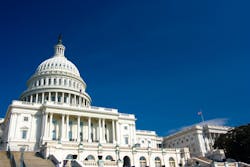A coalition of 19 national healthcare associations and other groups on Thursday, Nov. 19 wrote a letter to the national party leaders in the U.S. Senate and U.S. House of Representatives, asking them to ensure “that clinicians in advanced APMs [advanced payment models] continue to receive incentives established under the bipartisan Medicare Access and CHIP Reauthorization Act of 2015 (MACRA).” The letter was sent to Sen. Mitch McConnell (R.-Ky.), the Senate Majority Leader; Sen. Charles E. Schumer (D.-N.Y.), the Senate Minority Leader; Rep. Nancy Pelosi (D.-Calif.), the Speaker of the House of Representatives; and Kevin McCarthy (R.-Calif.), the House Minority Leader.
The letter opened thus: “Dear Senate Majority Leader McConnell, Speaker Pelosi, Senate Minority Leader Schumer, and House Minority Leader McCarthy: On behalf of the undersigned organizations, we appreciate your leadership and actions that Congress has taken to ensure providers are able to combat the COVID-19 virus and respond to the public health emergency. The pandemic has highlighted the need to continue the transition to value-based care that promotes care coordination across the traditional healthcare silos. Providers operating in alternative payment models (APMs) are aptly equipped to respond to the pandemic by leveraging existing community relationships and aligned networks of providers across the continuum to develop comprehensive approaches to maintain the health of the community and treat patients with COVID-19. Additionally,” the coalition’s leaders wrote, “providers in APMs rapidly expanded existing capabilities, such as care management, call centers, remote monitoring and telehealth, to meet the shifting care needs resulting from COVID-19. The response of providers across the country to the COVID-19 pandemic has resulted in significant financial challenges for many. If we had made more progress in value-based care APMs prior to COVID19, including risk-based and capitated arrangements, many providers could have avoided the financial challenges they faced. We urge Congress to continue to support the movement to value by ensuring that clinicians in advanced APMs continue to receive incentives established under the bipartisan Medicare Access and CHIP Reauthorization Act of 2015 (MACRA).”
At the core of their plea, the coalition’s leaders urged that the MACRA-based payment incentives must be adjusted in order to prevent many patient care organizations from failing to meet key thresholds in their programs. As the coalition’s leaders noted, “Clinicians receive a 5 percent bonus on Part B payments if they meet certain thresholds of payment or patients through an advanced APM. Currently, to qualify for the bonus clinicians must have 50 percent of payments or 35 percent of patients in the advanced APM. In 2021, the threshold rises to 75 percent of payments or 50 percent of patients. The patient and payment thresholds were set to increase over time to incent clinicians to continually expand the populations and services within the APM.” But, they noted that, “As we enter the fifth year of incenting clinicians to move to APMs, we now understand that the original thresholds set in MACRA are too high. A recent CMS report highlights that if these thresholds remain in place, a majority of clinicians will not qualify for this bonus moving forward. On average, the percent of payments through the APM for the Medicare Shared Savings Program was 48 percent in 2018. Moreover, the COVID-19 pandemic has made it more challenging to achieve the thresholds.”
The coalition’s leaders, addressing the congressional leaders, wrote, “We ask that you support legislation that would freeze the thresholds at the current rate, 50 percent payments or 35 percent patients, for the 2021 and 2022 performance years. This would ensure clinicians currently participating in risk-bearing APMs will continue to receive bonus payments and encourage other clinicians to join advanced APMs.”
“Freezing the patient and payment thresholds at the current 2020 rate is important so that physicians will continue to participate in advanced APMs,” said Don Crane, APG President and CEO of America’s Physician Groups (APG), the Los Angeles-based association of physician groups involve in value-based contracting, and which was one of the signatories to the letter. “We know that APMs save money for the Medicare program, so freezing current thresholds will prevent physicians from leaving these value-based models and encourage others to join.”
Here is the list of the 19 organizations, in alphabetical order:
Aledade
American Academy of Family Physicians
American College of Physicians
American Hospital Association
American Medical Association
American Medical Group Association
American Society for Radiation Oncology
America’s Essential Hospitals
America’s Physician Groups
Association of American Medical Colleges
Caravan Health
Evolent Health
Federation of American Hospitals
Health Care Transformation Task Force
Medical Group Management Association
National Association of ACOs
Next Gen ACO Coalition
Premier healthcare alliance
Renal Physicians Association


